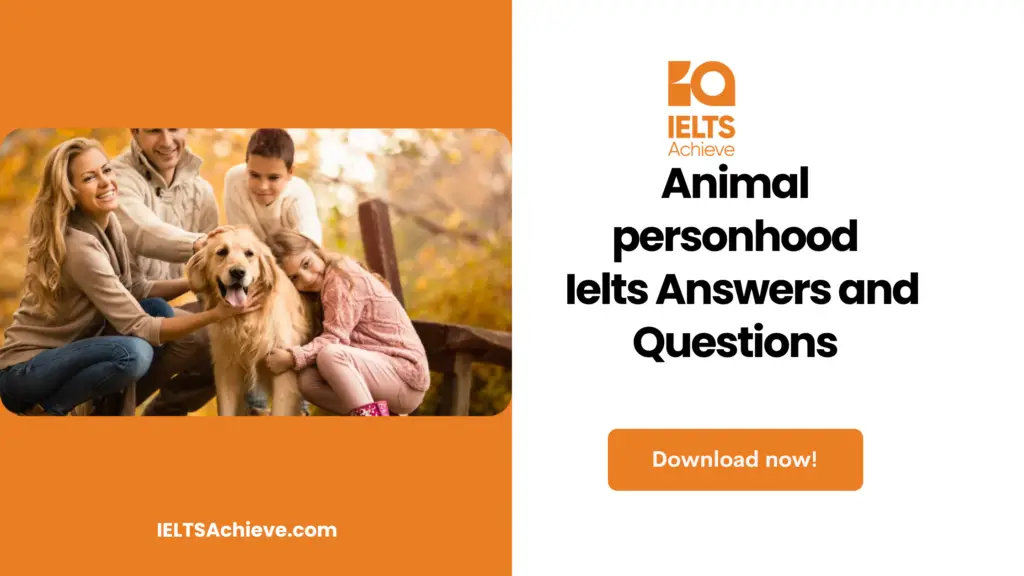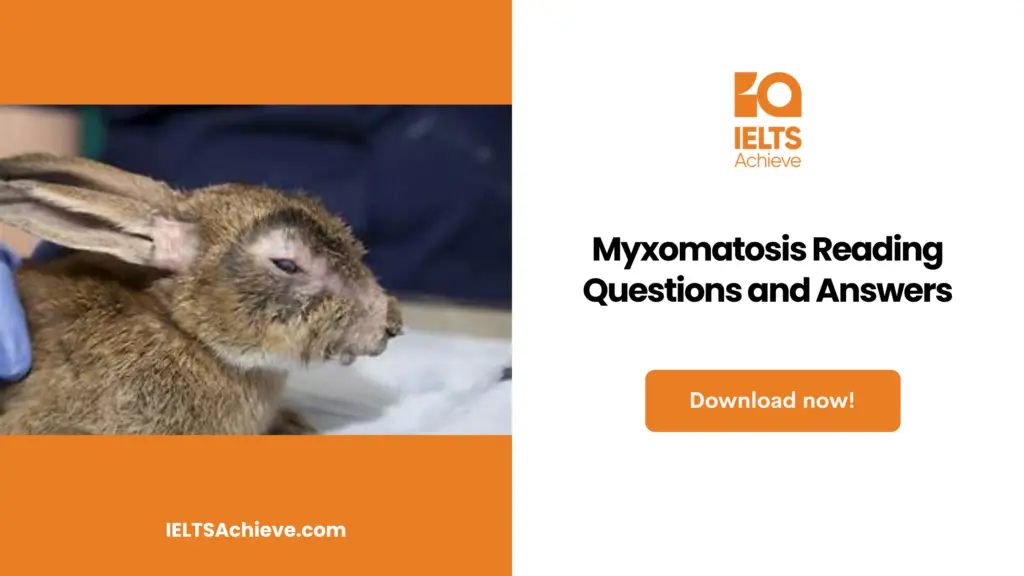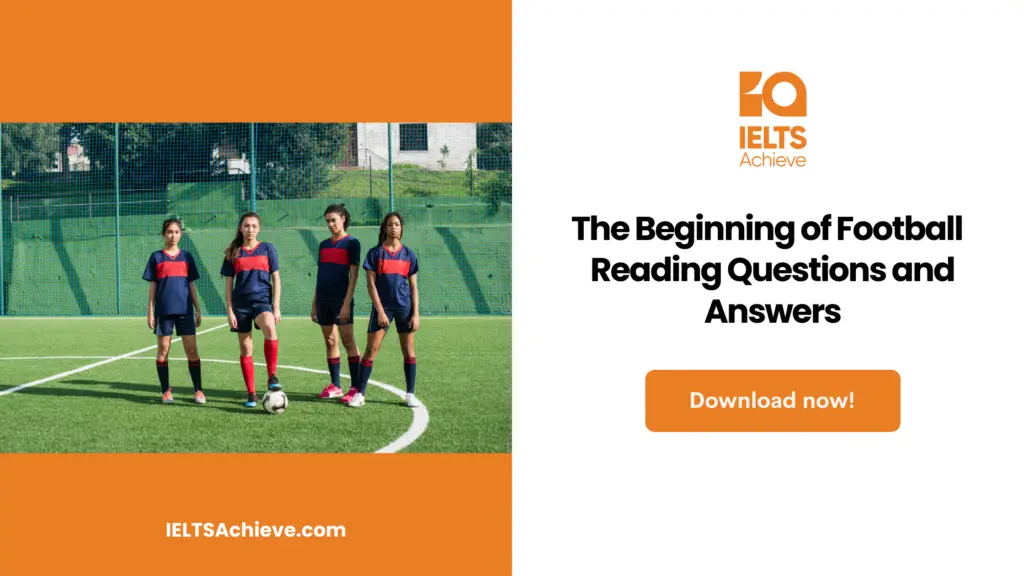The Blog post contains the following IELTS Reading Questions:
- IELTS Reading Multiple choice questions.
- IELTS Reading True/False/Not Given
- IELTS Reading Summary Completion
Stay informed and prepared for success – Explore our comprehensive Reading Test Info page to get valuable insights, exam format details, and expert tips for mastering the IELTS Reading section.
IELTS reading passage – Animal personhood

Animal Personhood
A. 4th-century-BC Greek philosopher, Aristotle, was the creator of the Great Chain of Being, in which animals ranked below humans without any reason. In the 17th Century AD, the Frenchman, Rene Descartes, considered animals as more complex creatures; however; they were autonomous without souls. After a century, Immanuel Kant, a German, came up with a proposal that animals should be treated in a less cruel manner, which might seem like an improvement. Still, Kant believed this very strongly as he thought that the acts of cruelty had a significant impact on their human perpetrators detrimentally.
B. In the mid-19th century an Englishman, Jeremy Bentham, questioning not their rationality or spirituality, but whether animals could suffer irrespective of the damage done to their victimizers; he concluded they could; in 1824, the first large organization for animal welfare, the Royal Society for the Prevention of Cruelty to Animals, was founded in England. In the year 1977, Peter Singer, an Australian, debated the ethics of meat-eating and factory farming in his highly influential book Animal Liberation, he also raised awareness about inhumane captivity and experimentation. Singer’s title also gave rise to other liberation movements, like those for women, which had developed in the post-war period.
C. An interest in the cognitive abilities of animals has resurfaced, more recently. Since the 1960s, it has been known that chimpanzees have sophisticated tool use and social interactions, but it is revealed in the research from the last two decades that they are also capable of empathy and grief, and they possess both self-awareness and self-determination. Other primates, whales, African grey, dolphins, and elephants are hugely intelligent too. Questions are being posed as to whether creatures so similar to humans should endure the physical pain or psychological trauma associated with habitat loss, dimensions or experimentation after new proof of animals is introduced. Although there may be more laws protecting animals than 30 years ago but in the eyes of law, no matter how smart or sensible an animal may be, it still has a lower status than a human being.
D. An American legal academic, Steven Wise, has been working to change this. He has a point of view that animals like the ones listed above are autonomous which means that they can control their own actions, or else, their actions are not caused by their reflex purely. He wants these animals considered legally as nonhuman persons because he believes existing animal-protection laws are weak and poorly enforced. He popularly joked that an aquarium can be fined for the cruel treatment of its dolphins but, currently the dolphins cannot sue the aquarium.
E. In the 1990s, during the time he was teaching at Vermont Law School, Wise had put his students in a dilemma: should we treat an anencephalic baby as a legal person? (A condition in which a person is born with a partial brain, he can breathe and digest, due to reflex, but otherwise, he is barely alert and not autonomous is called Anencephaly.) Overwhelmingly, his students would reply by saying “Yes”. He asked another question: can the same baby be killed and eaten by Humans? Overwhelmingly, his students replied ‘No’. His third question, always difficult to answer, was: why is an anencephalic baby a person, legally, yet not so fully functioning bonobo chimp?
F. Wise represents another analogy: between captive animals and slaves. During slavery in England, a human was chattel, and if the slave was stolen or injured, the thief or violator could be accused of a crime, and compensation was paid to the slave’s owner but not the slave. It was in the year 1772 that the chief justice, of King’s bench, Lord Mansfield, implemented that a slave could apply for habeas corpus, Latin for ‘You must have the body’, as the fee men and women have done since the ancient times. Habeas corpus does not consider innocence or guilt; rather, it means a detainee can be represented by a proxy in court. Once the slaves are granted habeas corpus, they existed as more than chattels with a legal system, though it was another 61 years before the slavery was abolished in England. Apart, from slaves, Wise has also studied numerous cases in which a writ of habeas corpus in place of those who were unable to appear in court, like children, patients, prisoners, or the severely intellectually impaired. In addition, Wise also writes that there are entities that are not living people that have legally become non-human persons, including ships, corporations, partnerships, states, a Sikh holy book, some of the Hindu idols and the Wanganui River in New Zealand.
G. In concurrence with an organisation called the Non-human Rights Project (NhRP), Wise has been a representative for captive animals in the US courts in an effort for having their legal status reassigned. Subsequently, the NhRP plans to apply, under habeas corpus, to represent the animals in other cases. Wise and the NhRP had a belief that a new status will discourage animal owners or nation-states from abuse or neglect, which current laws fail to do.
H. A law professor at New York University, Richard Epstein, is a critic of Wise’s. He is concerned that if animals are treated as the independent holders of rights, there would be only a little left of human Society, precisely, in the food and agricultural industries. Epstein accepts some current legislation concerning animal protection may need overhauling, but he sees no underlying problem.
I. According to other detractors, the push for personhood misses the point: it focuses on animals that are similar to humans without considering the main issue that all species have the right to existence, habitat, and role (be that plant, predator or decomposer). Human behavior changing dramatically towards other species is important for the survival- and this does not mean considering animals as non-human persons.
J. Currently, the NhRP has not succeeded in its applications for changing the legal status of chimpanzees in New York State but the NhRP considers it some kind of victory that the cases have been heard. Now, the NhRP can proceed to the Court of Appeals, where many emotive cases are decided and much common law is formulated.
K. Despite difficulties, Wise adamantly continues to expose brutality towards animals. Thousands of Years of perceptions might have to be changed in this process. He may have lost the battle, but he doesn’t accept he’s lost the war.
Unlock your full potential in the IELTS Reading section – Visit our IELTS Reading Practice Question Answer page now!
Recommended Questions:
Renewable Energy IELTS Reading Question with Answer
Animal Personhood Reading Questions
Questions 1-4
Choose the correct letter A, B, C or D. Write the correct option letter in boxes 28-31 on your answer sheet.
1. Why were animals placed below Human beings by Aristotle?
A. He had doubts that they behaved rationally
B. He considered them less intelligent
C. He thought them physically weaker
D. He had a belief that they didn’t have souls
2. Why did Kant think that humans should not treat animals cruelly?
A. Animals had importance in agriculture
B. Animals were useful in the military
C. Animals are sensitive as humans
D. Humans cruelly was destroying to themselves.
3. What concept of animals was developed by Bentham?
A. The presence of their suffering
B. The degree of their suffering
C. Their shocking brutality
D. Their shocking spirituality
4. When and where was the RSPCA funded?
A. In 1977 in Australia
B. In 1824 in England
C. In 1977 in Germany
D. In 1824 in the US
Ready to improve your performance in Multiple Choice Questions (MCQs)? Click here to access our comprehensive guide on how to tackle MCQs effectively in the IELTS Reading section.
Questions 5-6
Do the following statements agree with the information given in the Reading Passage?
In boxes 5 and 6 on your answer sheet, write
TRUE if the statement is true.
FALSE if the statement is false.
NOT GIVEN if the information is not given in the passage.
5. NhRP has gained success in its motive.
6. Wise still believes that he can win the battle against the brutality on animals.
Enhance your skills in identifying information as True, False, or Not Given. Click here to discover expert strategies and techniques for mastering this question type in the IELTS Reading section.
Questions 7-13
Complete the summary below.
Choose NO MORE THAN TWO WORDS from the passage for each answer.
Write your answers in boxes 7-13 on your answer sheet.
A New legal status for animals?
| Arguments for: | Steven Wise has a belief that some highly intelligent animals that are 7________ should have a new legal status. While animals are not humans, the law has a status for 8 _________ legally, already applied to ships, companies, and a river in New Zealand. If the Legal status of animals was changed, Wise and the NhRP can file for 9_________, in which a detainee is represented by someone else. Then, more effective action against animal abusers can be taken by them. |
| Arguments against: | Richard Epstein has a belief that the 10__________ of animals is important, but if animals had rights, the cost to human society would be too great. Others, like Thomas Berry, argue that rights are given by the universe and not by humans. Moreover, 11________ species have an equal right to exist. |
| Current situation in the US | Though the NhRP has not 12___________ in having the legal status of any of the animals altered, it continues its struggle. Changing two millennia’s worth of 13________ could prove hard. |
Boost your performance in Summary, Notes, Table, and Flowchart Completion tasks. Click here to explore our detailed guide and learn how to effectively complete summaries, notes, tables, and flowcharts in the IELTS Reading section.
Unlock your full potential in the IELTS Reading section – Visit our IELTS Reading Practice Question Answer page now!
Recommended Questions:
Renewable Energy IELTS Reading Question with Answer
Animal Personhood Reading Answers
1. A
2. D
3. A
4. B
5. FALSE
6. NOT GIVEN
7. AUTONOMOUS
8. NON-HUMAN PERSONS
9. HABEAS CORPUS
10. PROTECTION
11. ALL
12. SUCCEEDED
13. PERCEPTIONS

We hope you found this post useful in helping you to study for the IELTS Test. If you have any questions please let us know in the comments below or on the Facebook page.
The best way to keep up to date with posts like this is to like us on Facebook, then follow us on Instagram and Pinterest. If you need help preparing for the IELTS Test, join the IELTS Achieve Academy and see how we can assist you to achieve your desired band score. We offer an essay correction service, mock exams and online courses.

